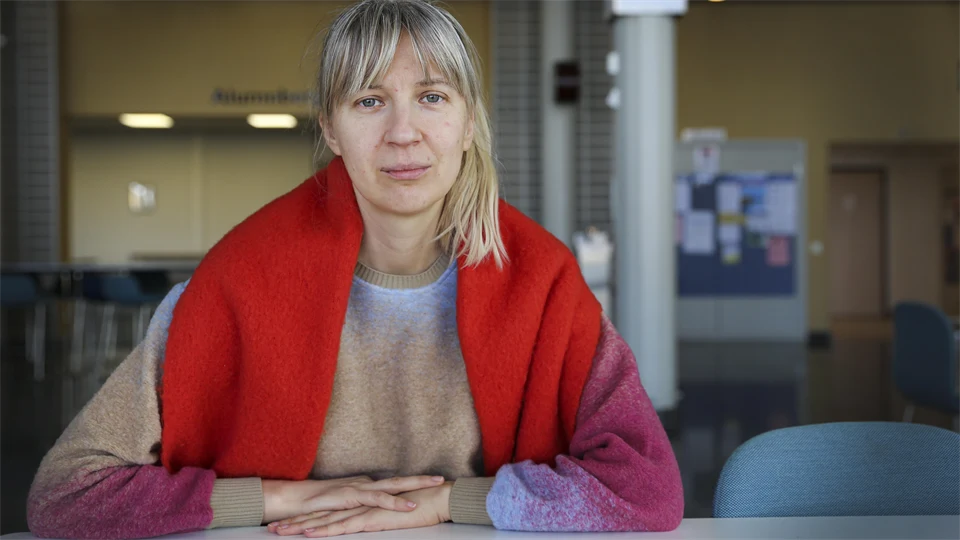I have never felt such emotional connection with all Ukrainians
Olga Milinchuk, teacher and researcher in tourism, came to Östersund and ETOUR nearly a year ago. She is one of the ukrainan researchers who had help from Mid Sweden University to come and work here.
Looking back, how would you describe this year?
– The year of the Russian war against Ukraine, for me, became the year of deep empathy and love for my country. I have never felt such emotional connection with all Ukrainians. Ukraine became one big family: when the heroism of one makes me proud of them, the sufferings of others respond within me by pain and tears, the wonders of salvation of civilians and soldiers create happiness for them. As a result, emotional swing from total hopelessness to strong belief in humanity winning and, hopefully, the winning of international law.
– It’s a year of wish to help to Ukraine as minimum in form of financial donations. You know it’s easy to help others but it’s not easy to get help from others. And these two new experiences created an enormous feeling of gratitude. Gratitude to the Ukrainian army which bravely defends the country, to all people which continue to live and to work in extremely difficult circumstances.
– I was fascinated by Sweden and Swedes before the war and this feeling became even bigger now. Gratitude also to the USA, Great Britain, Poland, Estonia, Bulgaria, Lithuania, Romania, Finland, Netherlands, Canada and to many other countries which continuously support Ukraine. Gratitude to people around me, to my colleagues, new friends which support me in a delicate and intelligent way. I trust Swedish society and feel safe here.
You are working at ETOUR and currently in two research projects, what are they about?
– From the beginning of 2023 I already work on two projects and both of them dedicated to the purpose of exploring guiding toward sustainability.
– The first one was funded by Mistra Sport and Outdoors and supervised by professor Peter Fredman. The project is about nature guides as agents of environmental sustainability in the Swedish outdoors. The question is: are they aware of their role and responsibility? And if so, how do they view this role and responsibility and how do they work with it, what experiences and practices do they have? And if not, why is there not a larger focus on their role and responsibility and are there opportunities to strengthen their guide activities to include more sustainable nature and outdoor practices? I am very grateful to my colleagues from the EJT department for the unique tourism research environment, possibility to discuss and realize the project.
– Another project is funded by KK foundation and aims to identify, experimentally test, and stimulate adoption of sustainability oriented guiding practices at cultural heritage sites. The project will be empirically grounded in the community of Järvsö. I am sure that it’s a well-known tourist destination to many Swedes. Järvsö has become the first certified sustainable destination in Sweden. I work in a cooperation with Järvsö AB DMO and Dr. Lusine Margaryan from ETOUR research center. It’s just the beginning and I am delighted how it will go.
How are you now and what is life like?
– I have an organized normal life of a woman with a 10 year old child. I say “10 years old” and understand that during this year we both celebrated birthdays here and have “plus one Swedish year” in our lives.
In a year from now, where are you then?
– One of my projects is planned for two years. Innovativeness of the project lies in experimentally testing efficiency of different messages and ways to message during the guiding process by using in a social science lab (RCR Lab) located at Mid Sweden University. So, I see myself here at Mittuniversitetet, Östersund campus, with you near fikaön, talking about the results of the experimentally tested guiding practices. And yes, I hope that in my country will be peace and development.
You went back to Ukraine for the Christmas holiday, what was that like?
– I have my mother, my brother and his family, a lot of friends, colleagues still in my hometown Zhytomyr. It almost hurts more psychologically to be here, where I follow the news constantly than to be there where life has adapted. Now, if there is a missile attack, everyone calmly goes down to the shelter and then back up again later. It became a “normal life” and people have adapted and can joke about this. But for a child it's better not to be there. I understand that it’s the right choice to be in Sweden now.
